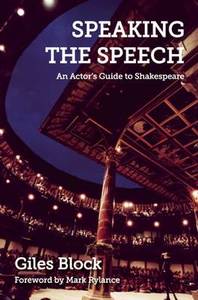Published by Nick Hern Books
Review by Peter King
The Master of the Words at the reconstructed Globe lives and breathes the magic of Shakespeare and is well placed to catch the echoes of the glory days of England’s most famous stage.
Giles Block, the text guru at Shakespeare’s Globe since 1999, sets out to capture the sound of the lines that the world’s greatest dramatist was hearing his characters speak as he scratched away in corners with his dashing quill.
The result is a handbook that Hamlet might have given to his players. The key is to speak the lines nimbly and trippingly: all must sound natural and new, and actors should embrace the infinite variety to be found in a single speech rather than attempting to impose a single emotional wash on it.
Balancing the big sweep of the whole canon with the tiniest textual detail, Block traces the beginning of doubt in Shakespeare’s characters and pinpoints turning points in his career. These include the writing of ‘The rape of Lucrece’, which was composed while the theatres were closed by the plague, when he gained a new insight into how people express themselves in a crisis, and the breakthrough marked by ‘The merchant of Venice’, in which he demonstrates for the first time his ability to conjure up a more intimate, personal way of speaking.
In the later plays shared lines become the normal way that Shakespeare captures the seamless flow of conversation, and any interruption to the regular heartbeat of the verse is sometimes explained by the stage business that would bump the incomplete pentameter to its metrical conclusion.
The two kings of English drama’s golden age, Marlowe and Shakespeare, born within a couple of months of each other, are presented as the rebel and the traditionalist: Marlowe sticks determinedly to blank verse to make a clean break with the rhyming past; Shakespeare prefers a fusion of the old and the new. His straddling of prose (the sound of speaking artfully) and verse (the sound of sincerity) is also explored.
Today’s actors are advised to take their cue from the punctuation marks in the Folio, which are inserted to show how the lines should be spoken rather than for grammatical purposes, with the commas and other marks printed being used to give emphasis to the words or phrases that precede them.
Little insights abound along the way, such as the comment about the two leading ladies in ‘Twelfth night’: ‘Olivia and Viola have much in common – even their names are created out of the same five letters.’
There is the odd lapse in the English, which Shakespeare would no doubt have turned a blind eye to, but the book is a tour de force from a theatrical insider who has made it his life’s business to plumb the breathing, living lines for all that is fresh and true.



